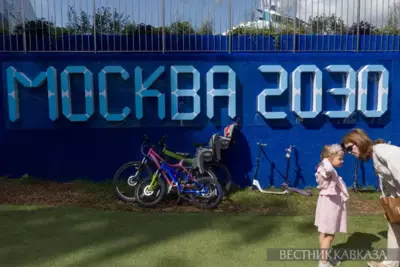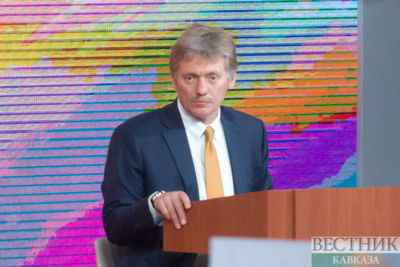The visit of President Islam Karimov to Moscow confirmed once again that Uzbekistan remains in the orbit of Russia, in spite of the multi-vectoral policy of the Uzbek authorities. The issues of economy and security were discussed during the talks with Russian President Vladimir Putin. Five agreements were signed on the results of the talks, including on cooperation in the implementation of the export of military goods to third countries.
Vladimir Putin invited Karimov to Moscow during the SCO summit in Ufa last summer. Then the Russian president noted that there had been no state visit to the Kremlin for a very long time. This meeting is very special – 10 years ago Russia and Uzbekistan signed a treaty on allied relations. It is time not only to take stock, but also to determine future plans. As noted by President Islam Karimov during the informal meeting with Vladimir Putin, ‘it's time to synchronize watches’. The last such synchronization took place in December 2014, when the Russian president visited Tashkent.
By the way, an agreement on the settlement of all existing mutual claims between Russia and Uzbekistan arising from transactions of the former USSR, as well as on loans granted to Uzbekistan in 1992-1993, was signed that time. On the eve of Karimov's visit to Moscow, the State Duma ratified the agreement on debt relief amounting to 865 million dollars. Tashkent commuted to pay the remaining $25 million. "The entry into force of this agreement opens up the additional possibilities for increasing the Russian economic and political presence in Uzbekistan,’’ an expert on Central Asia and the Middle East, Alexander Knyazev, told Vestnik Kavkaza. An important part of this is the presence of the Russian supplies in the framework of the bilateral intergovernmental agreement on implementation of the long-term program of modernization and re-equipment of the armed forces of Uzbekistan. The recent ratification of the agreement by the Russian side creates the prerequisites for leading Russia's position in this capacious market within the conditions of very real competition among a number of other countries.

The official bilateral talks, which were also attended by the ministers of the two countries and business representatives, also took place today. The presidents of Russia and Uzbekistan spoke about the informal meetings that had taken place immediately after the arrival of Karimov in Moscow and exchanged views on topical issues on the regional and international agenda, discussed cooperation in multilateral organizations, including the CIS, the UN and the SCO, the next summit of which will be held in Uzbekistan on July 23-24th. It is planned that a memorandum of accession of India and Pakistan to the SCO will be signed at the summit in Tashkent. For Islam Karimov, the summit’s host, this is a historic moment.
Another equally important issue is the security sphere, and it is currently being given special attention, the senior researcher of the Analytical Center IMI of the Russian MGIMO, Leonid Gusev, believes. "This is due to the fact that the situation in Afghanistan has worsened in the last year, with which Uzbekistan has a common border. In addition, there are the militants of ISIS (banned in Russia as an extremist organization) in Afghanistan, and the Uzbek extremist structures, especially the Islamic Movement of Uzbekistan (IMU), which has long been considered as one of the most dangerous in the region. In this context the cooperation could significantly reduce the spread of these threats in our countries," the expert told Vestnik Kavkaza.
Islam Karimov proposed including Russia in the negotiating process to resolve the situation in Afghanistan. "We believe the attempts to solve this problem without Russia are ill-considered and hasty. Those who think about doing this are deeply mistaken,’’ he said after talks with Russian President Vladimir Putin. According to the Uzbek president, ‘’to achieve progress in the solution of the Afghan problem, it would be appropriate to invite representatives of the Russian Federation to participate in the talks.’’
"Uzbekistan, in general, agrees with the gradually dominating point of view of Moscow that the solution to the Afghan issue lies solely in the political rather than in the military sphere. And with the involvement of the Taliban movement in the intra-Afghan political process, though it is an opposition force, which is in a state of the war with Kabul. Tashkent, as well as Moscow, does not preclude the retention of a certain role one of the leaders of the Afghan Uzbeks, General Abdul Rashid Dostum, in the situation in northern Afghanistan. But Tashkent has been watching his cooperation with the Turkish secret services for a long time and without satisfaction, Tashkent may try to pass Moscow this quite reasonable issue, which is even more significant in the current situation of the Russian-Turkish conflict,’’ Knyazev said.
As a result, the two leaders came to a decision on the need to build a broad anti-terrorist coalition on the basis of international law and under the UN auspices. "We are convinced of the need to form a broad anti-terrorist coalition, acting on the basis of international law and under the auspices of the UN, especially with regard to Afghanistan,’’ Putin said after the talks with the head of Uzbekistan.
As for the economic part, Russia remains the largest economic partner and investor of Uzbekistan. As an expert of the Research Center on Issues of Neighboring Countries RISS, Ivan Ippolitov, told VK, the Russian labor market is now attractive for Uzbekistan. "Many people in this country are interested in finding ways to simplify labor migration to Russia. It is well known now that there is a patent policy working in Russia for the citizens of Uzbekistan, which creates for them less favorable conditions than, for example, for the citizens of Kyrgyzstan, a member of the Eurasian Economic Union (EAEC). The Uzbek authorities have repeatedly stated that they are not considering the prospects of accession to the EAEC for the moment. However, this does not alter their interest in searching for an agreement to have a preferential regime of Uzbek agricultural products, automotive, etc. supplies on the Eurasian market. It is no secret that the current economic crisis has not bypassed Uzbekistan,’’ Ivan Ippolitov said.

















